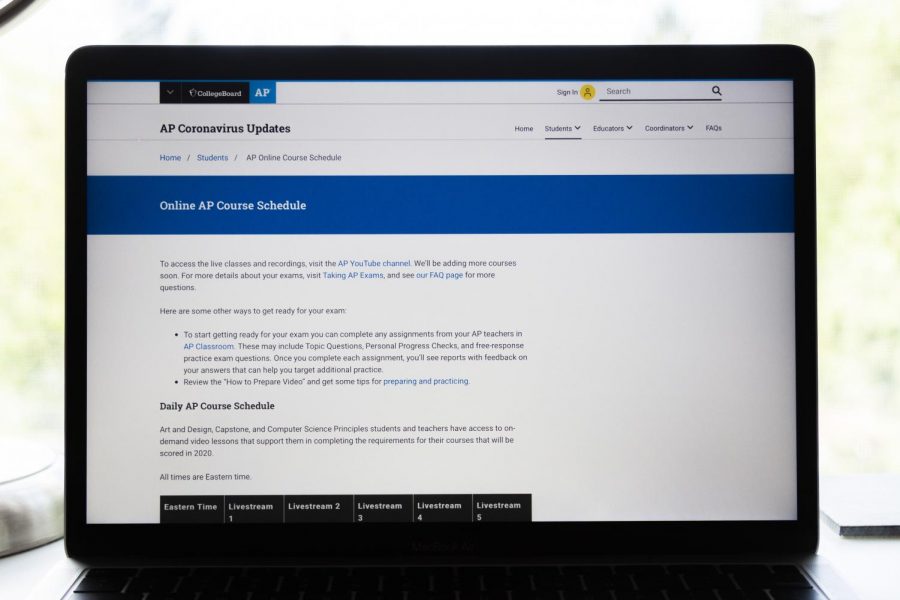COVID-19 Has Already Caused Enough Stress. AP Exams Shouldn’t Make It Worse.
Having students take AP exams at home, especially with the new modified format, adds unnecessary concern and stress as they complete digital learning during quarantine.
May 6, 2020
Being at home during the COVID-19 outbreak is already stressful enough for us high school students. Almost every weekday, we are asked to complete assignments digitally in order to finish the semester from home.
While we are completing and turning in DLD work, we are not learning the same way that we would in a classroom. Most of the time, I’m more worried about completing an assignment and moving on with my day rather than actually understanding the material. As time in quarantine lengthens, any motivation that I have to complete my classes is declining.
As a junior, I am signed up for two Advanced Placement courses this year: AP English 3 and AP Calculus BC. Throughout the entire school year, my fellow classmates and I were planning to take the AP tests in the same way that we would any other year.
However, this school year has been anything but normal.
When I first learned that the rest of the academic year would be completed digitally, one of the several things that came to mind was what was going to happen in my AP classes.
I had a number of concerns.
Am I still going to take AP tests? Can I still receive college credit? Is the College Board going to give everyone passing grades? How am I supposed to take a comprehensive, three-hour long test from home?
Even to this day, about two months after hearing that school would remain closed for the entire year, I still have some unanswered questions.
Now that it’s May, the start of AP testing is approaching, leaving me with only a few days to prepare and study for my exams.
As I worry about what these tests are going to look like from home, I can’t help but feel overwhelmed. I try not to think about them constantly as I complete work for my AP courses, but the stress of still having to take these tests is causing me to lose sleep at night.
For some students, taking AP tests from home may seem like a blessing because we are, for the most part, only being tested on what we learned while in the classroom. Also, students are allowed to reference their notes during the tests, which have been shortened to only 45 minutes in length rather than three hours.
While there are some positive aspects about taking the AP tests from home, I still wonder why we even have to take these tests at this point.
For the AP Language and Composition test, the previous format included three types of handwritten essays: synthesis, rhetorical analysis, and argument. There was also a section of multiple choice questions based on comprehension of given texts.
In order to prepare for this test, my fellow classmates and I wrote 10 handwritten practice essays that replicated the AP exam from previous years.
Now, we are only writing one rhetorical analysis style essay.
Personally, I struggle most with rhetorical analysis essays compared to the other two we have practiced writing. As I prepare for the AP test now, I am worried that my chances of passing are lower than they were before the COVID-19 outbreak. Also, my motivation to prepare for these unprecedented changes is slipping.
Similarly, with my AP Calculus BC class, I am experiencing challenges. This class was already difficult when I was physically present for classes, as I would constantly ask questions and get extra help before or after school.
The format for this test used to consist of both free response as well as multiple choice questions. Additionally, it was organized by calculator and non-calculator sections. Now, we will only be tested on three free response questions.
Since the switch to online learning, getting answers to my math questions has been extremely difficult.
While Zoom meetings and Schoology messages might help with specific questions, I worry about some of the major topics that will be covered on the AP exam this year. Math videos and online communication can only teach me to a certain extent, especially when compared to in-person instruction.
Despite this, I understand that preparing for AP exams is difficult for teachers as well, and they seem to be doing all that they can in order to make sure that we’re prepared.
My teachers have been flexible and approachable about any concerns that I have about AP tests. They’ve provided Zoom sessions for students to check-in and ask questions, posted practice AP tests from previous years to help us study, and have been communicating frequently with students. I am thankful for all of the hard work that they have been doing to help my peers and I, and I do not feel that they are to blame for my stress about taking the AP tests.
Another concern of mine is being able to follow specific instructions in order to take the AP exams. If I experience any sort of technological error, then no score is given, leaving me no choice but to either accept a zero or wait for one of the make-up days in June. If I end up having to wait an extra month, I’d have to relive the same stress that I’ve been feeling already.
Though taking AP tests is not required, I don’t want to quit now, knowing that I have a chance to earn college credit for my courses. That is what motivated me most when I chose classes for my junior year.
Instead of going through all of the stress involved with taking the shortened AP tests from home, the College Board should have created a less overwhelming way to assess students.
However, given the current 45-minute format that the College Board has announced, it should be graded using a pass or fail system rather than the 1 through 5 scale. Since AP tests are formatted differently than in years past, having a more lenient grading system could help students feel less stressed out as they prepare for their exams.
Life is stressful enough during this unprecedented time. AP tests should not add extra concern for students while in quarantine. Instead, we should focus on finishing the rest of the school year at home and managing our mental health.





